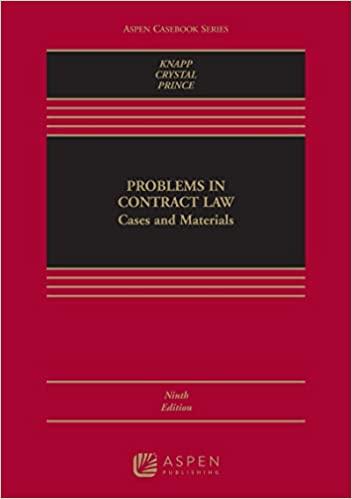Question
Q1) Which of the following is not correct? O A. All letters of credit are irrevocable pursuant to the UP Rules. O B. An exporter
Q1) Which of the following is not correct? O A. All letters of credit are irrevocable pursuant to the UP Rules. O B. An exporter presenting documents under a letter of credit cannot expect to receive payment from the corresponding bank until the importer has received the goods in the destination country O C. A letter of credit must specify the period of time in which documents must be presented for payment, acceptance, or negotiation. O D. All letters of credit are irrevocable so that the commitment of an issuing bank is binding, provided that the correct documents are presented on time. O E. An exporter will always prefer a letter of credit that provides for a confirming bank, although this will increase the cost of the letter of credit to the importer.
Q2) Which of the following is correct? O A. The name of the pre-contractual document will generally determine whether or not it is meant to be legally binding O B. In most cases, pre-contractual documents are not legally binding O C. Pre contractual documents do not include memorandums of understanding (MOL) O D. A pre contractual document is often not necessary as a basis for drafting the final contract O E. Pre contractual documents are always legally binding
Q3)Which of the following is not correct? O A. In common law countries, normally, only the parties to a contract may sue for breach of that contract. O B. If one party has made a false or misleading statement in the course of the negotiation of a contract, the other party may have the right to have the contract set aside C. A breach of warranty or condition entitles an innocent party to walk away from a contract with no further obligation to perform. O D. A choice of law clause is a provision in a contract in which the parties specify that any dispute arising under the contract shall be determined by the law of a specific jurisdiction. O E. A contract may meet the usual requirements for enforceability, but be unenforceable due to a mistake; that is, when the parties do not have the same objective in mind in agreeing to the terms of the contract
Q4) Which of the following is correct? O A. None of the answers B. In a Canadian court, a litigant wanting to rely on a choice of law clause that specifies a foreign law will have to provide evidence as to what the appropriate foreign law is, because the court has no independent duty to ascertain the content of the foreign law O C. Parties to an international contract are free to utilize a choice of law clause in order to avoid the public policy of a country with a close connection to the contract O D. For Canadian businesses, a statement in the international contract providing that the laws of Canada will apply to the contract is sufficient to ensure that the relevant Canadian law will apply to the contract. O E. If the parties to an international contract have not made a choice of law, the court will have to determine what is the proper law of the contract, which is a straightforward matter based on where the contract is to be performed
Q5) Gilles has been negotiating with a local mechanic, Yvette, who would like to purhase his auto repair shop in Montreal, Quebec. Gilles' shop is no longer in compliance with local laws regarding the handling and disposal of hazardous waste. Gilles understands that Yves would like to use the property to operate her own auto repair shop. However, throughout the negotiations, she has not asked Gilles about whether the property would be fit for this purpose. Which of the following is true? O A. In the absence of consideration, there is no agreement between the parties and no obligations exist O B. The onus is on Yvette to ask questions about the shop and satisfy herself that it is suitable for her intended use. O C. In Quebec, the obligation to act in good faith does not arise during the negotiation phase. O D. Gilles has an obligation to inform Yvette that the property is not fit for the intended purpose E. The only option for Yvette is to commence a court action for damages after the parties have entered into an agreement of purchase and sale.
Step by Step Solution
There are 3 Steps involved in it
Step: 1

Get Instant Access to Expert-Tailored Solutions
See step-by-step solutions with expert insights and AI powered tools for academic success
Step: 2

Step: 3

Ace Your Homework with AI
Get the answers you need in no time with our AI-driven, step-by-step assistance
Get Started


